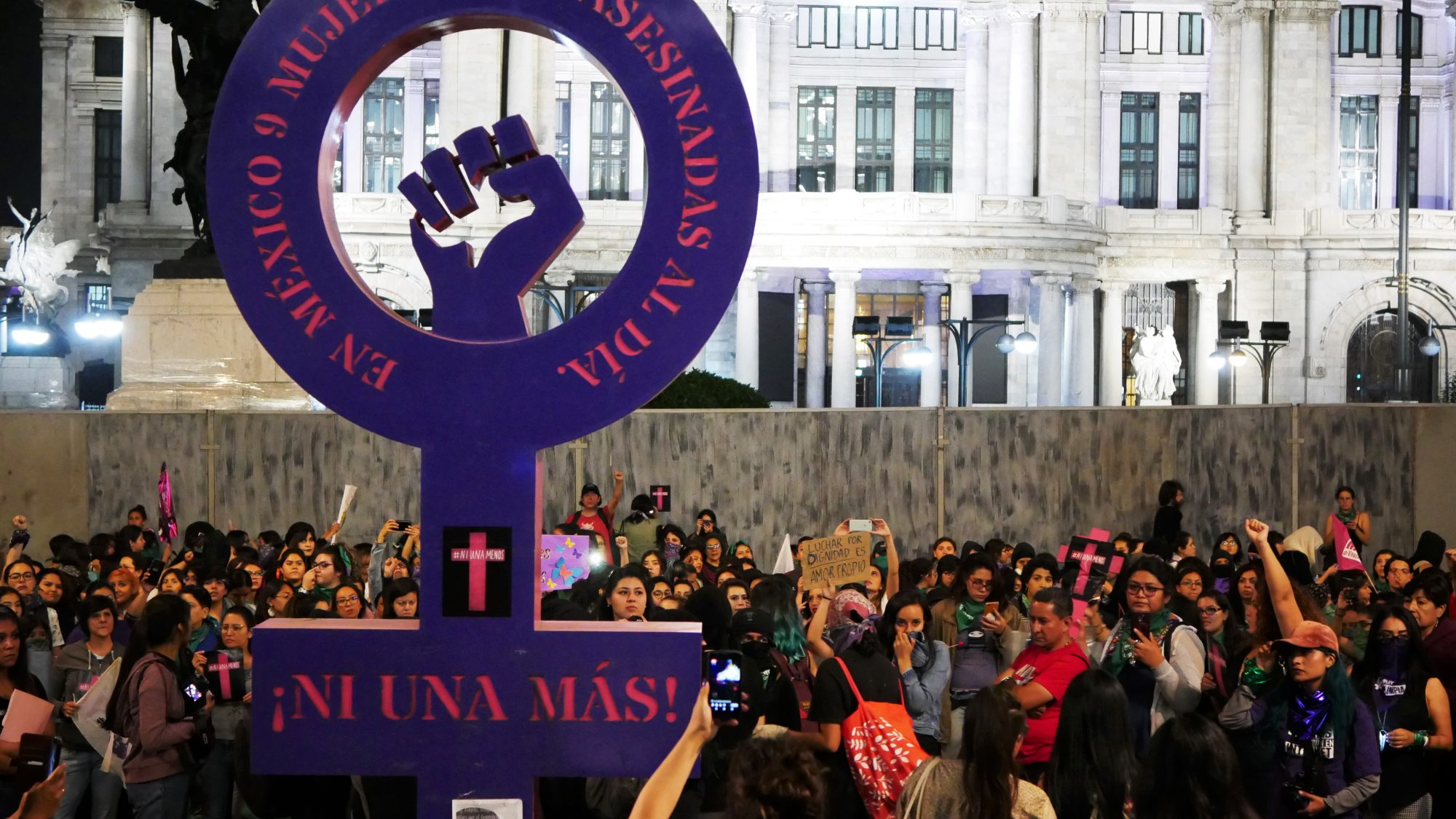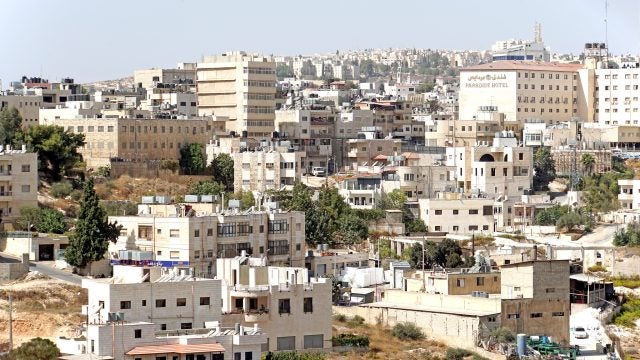
Title: “Police Do Not Protect Me, My Female Friends Do”: Police Repression against Feminists in Mexico
Mexican feminists have used the hashtag “la policía no me cuida, me cuidan mis amigas” (police do not protect me, my female friends do) to denounce and document sexual abuse and harassment at the hands of police and the sharp increase in police repression against feminist demonstrations. The repression of these feminist demonstrations suggests a new and disturbing pattern of the criminalization of women’s right to mobilize.
The hashtag “la policía no me cuida, me cuidan mis amigas” has spread widely and rapidly across Mexico and Latin America. As in Latin America, Mexican feminists have used this hashtag to denounce and document through social media sexual abuse and harassment at the hands of police and the sharp increase in police repression against the resurgence of feminist street activism since 2016. By November 10, 2020, several feminist demonstrations had been repressed in various cities around the country, including Culiacán in Sinaloa (March), León in Guanajuato (August), Ecatepec and Atizapán in the State of Mexico (September), Ciudad Juárez in Chihuahua (September), Mexico City (February, September, and November), and Cancún in Quintana Roo (November).
The use of violent tactics by police in demonstrations, including arbitrary detention, excessive use of force, and sexualized violence against female protestors, is not new in Mexico in particular. However, the recent repression of feminist demonstrations suggests a new and disturbing pattern of the criminalization of women’s right to mobilize. Demonstrations and protests have been an important feminist mobilization strategy to raise awareness and demand state accountability for the prevalence of gender-based violence and feminicide, as well as their high rates of impunity. Feminicide is often used interchangeably with femicide, which is commonly defined as the murder of women because they are female. However, feminicide also refers to gender-based violence that, according to Rosa-Linda Fregoso and Cynthia Bejarano, “implicates both the state (directly or indirectly) and individual perpetrators (private or state actors) [and] systemic violence rooted in social, political, and cultural inequalities.” Thus, feminicide captures the relationship between the killing of women and systemic impunity that is tolerated by the state. Feminist mobilizations, therefore, are a direct challenge to the state’s role in sustaining the structural, political, and socio-cultural conditions that allow feminicide to occur and impunity to prevail. In turn, the state’s use of police force against feminists can be interpreted as an attempt to silence women and create a political narrative that positions them as violent and criminal when they threaten state power.
Despite claiming to be a different type of president than his predecessors, Andrés Manuel López Obrador, or AMLO, has not only been unable to curb the high rates of feminicide in the country but has consistently argued that this crime has the same underlying causes as homicide. According to AMLO, these causes are related to the breakdown of the family, the loss of social values, and economic inequality created by past neoliberal policies. He has also claimed that under his administration, the state is no longer the main perpetrator of human rights violations.
Yet feminists have rejected his assertions, pointing out that feminicide is a gendered crime that is neither equivalent to the criminal offence of homicide nor to the homicide of women. Article 325 of the Federal Criminal Code recognizes feminicide as, “The deprivation of a woman of her life for gender reasons.” Feminists have further critiqued his administration’s austerity policies, which have drastically cut funding to women’s shelters (exacerbating women’s vulnerability to violence during the COVID-19 pandemic), programs combating gender inequality and feminicide, and even to the National Women’s Institute (INMUJERES). The National Citizen Feminicide Observatory has also emphasized that despite existing federal and state laws that have codified feminicide as a crime and newly developed feminicide investigation protocols, only a minority of cases of feminicide are investigated or prosecuted as such. Thus, most perpetrators go unpunished. This is especially alarming, since ten women and girls are murdered daily in Mexico. While the crime of feminicide carries the same penalties as the crime of homicide, for feminists it is important to prosecute these murders as feminicide because it requires the judicial process to adopt a “gender perspective.” A gender perspective reveals how gendered power inequalities translate into violence against women that culminate in their murders. Moreover, failing to investigate or prosecute the murder cases allows authorities to deny that feminicide is a serious and prevalent crime and social problem in the country, further fostering a climate of impunity.
The tensions between AMLO, police, and feminists began escalating in early February 2020, in the aftermath of the gruesome feminicides of seven-year-old Fátima Alridguett and twenty-five-year-old Ingrid Escamilla. Feminists were outraged that AMLO prioritized discussing the raffle of the presidential plane instead of responding to these murders, especially since Mexico City authorities leaked images of Ingrid’s skinned body to the media. Hence, various feminist collectives called for feminists and women, in general, to mobilize across the country on February 14. . In response, the female-only police group Atenea used extinguishers to spray a chemical dust with similar effects to tear gas directly onto demonstrators’ faces. Claudia Scheinbaum, Mexico City’s mayor, claimed that the Ateneas had only personal protection equipment and no gases of any kind, since one of the main responsibilities of this police group is to safeguard individuals who participate in demonstrations, protests, or large events. AMLO in turn interpreted feminists’ graffitiing of historical buildings and the protest itself as part of a conspiracy against him and his administration.
This pattern of police violence continued in the feminist demonstrations that followed throughout 2020. In Culiacán, police intimidated and arbitrarily detained a group of feminists and women who mobilized as part of Mexico’s International Women’s Day march. In León, where feminists protested the sexual harassment of Evelyn Lizet Valdez Virgen at the hands of a police officer, police responded by arbitrarily detaining twenty-two women; some of them claimed to have been sexually abused in detention. Feminists in Ciudad Juárez mobilized in response to police repression in León and were met with similar forms of police violence. Likewise, police arbitrarily detained several women and feminists who had taken over the building of the Human Rights Commission in Ecatepec to denounce the failure of state authorities to respond to cases of sexual violence. Several detained women claimed that they had been sexually abused and tortured by police. In Mexico City, during the feminist march of September 28 (28S), International Safe Abortion Day, the Ateneas first divided and then surrounded the women who were protesting, eventually . The Ateneas thus prevented women from leaving the demonstration, and also sprayed chemical dust on them. Feminist activists have , however, that there were male police involved as well, who proceeded to verbally attack, harass, hit, and touch women in inappropriate sexual ways. Most recently, different groups of police were involved in the kettling of several feminist protestors when they were mobilizing in response to the feminicide of Bianca Alejandrina Lorenzana Alvarado (Alexis) in Cancún, arbitrarily detaining and sexually abusing some of them. Police also shot into the crowd, injuring a few demonstrators and journalists.
AMLO’s assertion that the state is no longer a perpetrator of human rights violations has been put into question by these violent police actions. Edith Olivares, the Human Rights Director of Amnesty International in Mexico, argued in an interview with the feminist collective Luchadoras that these actions violate international law in a number of ways. First, kettling should only be used to target individual protestors engaged in violent practices during a demonstration, not to target an entire group. Kettling time should be minimized and individuals should be able to leave demonstrations. Second, though the use of chemical agents is also permitted, police forces should announce that they will be deployed and specify what they are. Ultimately, neither the use of force nor chemical agents should be used to attack demonstrators, but rather to dissuade them from engaging in violent practices. Both of these guidelines have been repeatedly violated by the Mexican police in demonstration after demonstration.
Olivares, like other feminist activists and journalists interviewed by Luchadoras, was highly critical of authorities’ reluctance to reveal what the chemical dust is as well as the reasoning for its violet or green coloring. Violet and green are colors associated with feminists’ struggles for women’s sexual and reproductive rights and against gender-based violence. In the interview with Luchadoras, various feminist journalists argued that the Ateneas’ use of this coloring represents a tactic to create confusion among demonstrators, or to pretend that feminists are behind these acts of violence in order to legitimize the use of force against them. By using tactics like kettling for prolonged periods and dispersing chemical dust, police have put their own agents at risk, Ríos is the subdirector of the Brigada de Paz Marabunta, a group of civilians who are trained in documenting police violence in protests and providing assistance to demonstrators. In fact, Ríos has noticed that the women who constitute the Ateneas do not always have proper personal protection equipment, although it is unclear as to why this is the case. Second, kettling leads to heightened tensions between feminist protestors and female police agents, which may lead to conflict in future demonstrations.
Equally problematic has been the response of AMLO and local state officials, all of whom espouse a narrative that views police repression as the outcome of a few bad apples, while simultaneously discrediting feminists and their legitimate right to protest. By claiming that feminists have been infiltrated by the right or that they are acting criminally, AMLO and other state actors lose sight of what feminists are fighting against, namely the state’s failed response to the prevalence of gendered violence and feminicide in the country.
As such, for feminist activists, the growing pattern of police violence against them and the attendant official narrative to discredit their mobilizations amount to state and institutional violence. It is not surprising, therefore, that they have reacted by saying “Si tocan a una, respondemos todas” (if they touch one of us, we all will respond). It is this form of feminist solidarity that will likely continue to fuel the resurgence of feminist street activism to demand state accountability for feminicide and gender-based violence, regardless of the efforts of the state to undermine or silence them.
. . .
Paulina García-Del Moral is Assistant Professor in the Department of Sociology & Anthropology at the University of Guelph, Canada. Her works focuses on the intersection of gender, law, and power in transnational processes in Latin America and Canada. Her work has been published in Gender & Society, Law & Society Review, Signs: Journal of Women in Culture & Society, and Current Sociology, among other venues.
Image Credit: Thayne Tuason, 2019
Recommended Articles

Critical maritime infrastructures (CMI), and in particular undersea communication cables, are increasingly under threat of attacks by malign actors who benefit from asymmetric capabilities and jurisdictional complexities in the maritime…

This article explores how the Palestinian crisis and the death of the two-state solution endangers the Hashemite Kingdom of Jordan. It illuminates the complicated relationship between Jordan, Israel, and Palestine…

This article explores the uncertain future of Arctic governance amid shifting global geopolitics. It argues that whether Washington and Moscow opt for confrontation or cooperation, multilateralism in the Arctic…